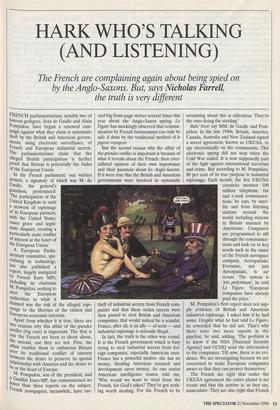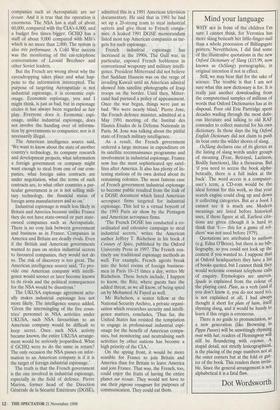HARK WHO'S TALKING (AND LISTENING)
FRENCH parliamentarians, notably two of famous pedigree, Jean de Gaulle and Alain Pompidou, have begun a renewed cam- paign against what they claim is systematic theft by the British and American govern- ments, using electronic surveillance, of French and European industrial secrets. The parliamentarians claim that the alleged British participation is further proof that Britain is potentially the Judas of the European Union. In the French parliament, one written protest, a signatory of which was M. de Gaulle, the general's grandson, pronounced: The participation of the United Kingdom in such a network of espionage of its European partners, with the United States, raises grave and legiti- mate disquiet, creating a Particularly acute conflict of interest at the heart of the European Union.'
Apart from whether it is true, there are two reasons why this affair of the grandes oreilles (big ears) is important. The first is one the French are keen to shout about, the second, one they are not. First, the affair enables them to embarrass Britain Over its traditional conflict of interest between the desire to preserve its special relationship with America and the desire to be at the heart of Europe. M. Pompidou, son of the president, and a Gaullist Euro-MP, has commissioned no !ewer than three reports on the subject. French newspapers, meanwhile, have car- ried big front-page stories several times this year about the Anglo-Saxon spying. Le Figaro has mockingly observed that commu- nication by French businessmen can only be safe if done by the traditional method of le pigeon voyageur.
But the second reason why the affair of the grandes oreilles is important is because of what it reveals about the French: their over- inflated opinion of their own importance and their paranoia about les Anglo-Saxons. If it were true that the British and American governments were involved in systematic theft of industrial secrets from French com- panies and that these stolen secrets were then passed to rival British and American companies, that would indeed be a scandal. France, after all, is an ally — of sorts — and industrial espionage is seriously illegal.
In fact, the truth is the other way round. It is the French government which is busy trying to steal industrial secrets from for- eign companies, especially American ones. France has a powerful motive: she has no money. Stealing American research and development saves money. As one senior American intelligence source told me, `Why would we want to steal from the French, for God's sakes? They've got noth- ing worth stealing. For the French to be screaming about this is ridiculous. They're the ones doing the stealing.'
M. Pompidou's first report does not sup- ply evidence of British and American industrial espionage. I asked him if he had some. Despite what he had told Le Figaro, he conceded that he did not. That's why there were two more reports in the pipeline, he said, adding, 'The problem is to know if the NSA [National Security Agency] and GCHQ send the information to the companies. Till now, there is no evi- dence. We are investigating because we are concerned to make European companies aware so that they can protect themselves.'
The French are right that under the UKUSA agreement the entire planet is sur ecoute and that the systeme is, as they say, tentaculaire. They are also right that French companies such as Aerospatiale are sur ecoute. And it is true that the operation is enormous. The NSA has a staff of about 60,000, compared with the CIA's 6,000, and a budget five times bigger. GCHQ has a staff of about 9,000 compared with MI6's which is no more than 2,000. The system is also tres performant. A Cold War success was the monitoring of the car-telephone conversations of Leonid Brezhnev and other Soviet leaders.
But the French are wrong about why the eavesdropping takes place and what hap- pens to the information intercepted. The purpose of targeting Aerospatiale is not industrial espionage, it is economic espi- onage. Economic espionage, you and I might think, is just as bad, but in espionage circles it has always been regarded as fair play. Everyone does it. Economic espi- onage, unlike industrial espionage, does not involve the handing over of informa- tion by governments to companies; nor is it necessarily illegal.
The American intelligence source said, `We want to know about the state of another country's technology, its company research and development projects, what information a foreign government or company might want enough to steal from one of our com- panies, what foreign sales contracts are under negotiation, what the terms of such contracts are, to what other countries a par- ticular government is or is not selling mili- tary technology, the financial status of foreign arms manufacturers and so on.'
Industrial espionage is much less likely in Britain and America because unlike France they do not have state-owned or part state- owned companies such as Aerospatiale. There is no cosy link between government and business as in France. Companies in America and Britain are deadly rivals. Even if the British and American governments wanted to pass on stolen industrial secrets to favoured companies, they would not do so. The risk of discovery is too great. The American intelligence source said, 'To pro- vide one American company with intelli- gence would sooner or later become known to its rivals and the political consequences for the NSA would be disastrous.'
The UKUSA espionage agreement actu- ally makes industrial espionage less not more likely. The intelligence source added, `Given the intermingling of the five coun- tries' personnel in NSA activities under UKUSA, such NSA favouritism to an American company would be difficult to keep secret. Once such NSA activity became known, the entire UKUSA arrange- ment would be seriously jeopardised. What if GCHQ were to do the same in return? The only occasion the NSA passes on infor- mation to an American company is if it is the target of foreign industrial espionage.'
The truth is that the French government is the one involved in industrial espionage, especially in the field of defence. Pierre Marion, former head of the Direction Generale de la Securite Exterieure (DGSE), admitted this in a 1991 American television documentary. He said that in 1981 he had set up a 20-strong team to steal industrial secrets and give them to French compa- nies. A leaked 1991 DGSE memorandum listed most top American companies as tar- gets for such espionage.
French industrial espionage has increased in the 1990s. The Gulf war, in particular, exposed French feebleness in conventional weaponry and military intelli- gence. President Mitterrand did not believe that Saddam Hussein was on the verge of invading Kuwait until an American admiral showed him satellite photographs of Iraqi troops on the border. Until then, Mitter- rand had pursued a policy of appeasement. Once the war began, things were just as bad. 'We were nearly blind,' Pierre Joxe, the French defence minister, admitted at a May 1991 meeting of the Institut des Hautes Etudes de la Defense Nationale in Paris. M. Joxe was talking about the pitiful state of French military intelligence.
As a result, the French government ordered a large increase in expenditure on its satellite reconnaissance programme and involvement in industrial espionage. France now has the most sophisticated spy satel- lites after America. It also has plenty of lis- tening stations of its own dotted about its remaining colonies. The most famous case of French government industrial espionage to become public resulted from the leak of a DGSE document which listed American aerospace firms targeted for industrial espionage. This led to a virtual boycott of the 1993 Paris air show by the Pentagon and American aerospace firms.
`The French DGSE has conducted a co- ordinated and extensive campaign to steal industrial secrets,' writes the American author Jeffrey T. Richelson in his book A Century of Spies, published by the Oxford University Press in 1997. The French rou- tinely use traditional espionage methods as well. For example, French agents break into the hotel rooms of foreign business- men in Paris 10-15 times a day, writes Mr Richelson. These hotels include, I happen to know, the Ritz, where guests face the added threat, as we all know, of being spied on by Mohamed Al Fayed as well.
Mr Richelson, a senior fellow at the National Security Archive, a private organi- sation which researches security and intelli- gence matters, concludes, 'Thus far, the United States has resisted the temptation to engage in professional industrial espi- onage for the benefit of American compa- nies, but monitoring and neutralising such activities by other nations has become a high priority of the CIA.'
On the spying front, it would be more sensible for France to join Britain and America than for Britain to leave America and join France. That way, the French, too, could enjoy the fruits of having the entire planet sur ecoute. They would not have to use their pigeons voyageurs for purposes of communication. They could eat them.



















































































 Previous page
Previous page